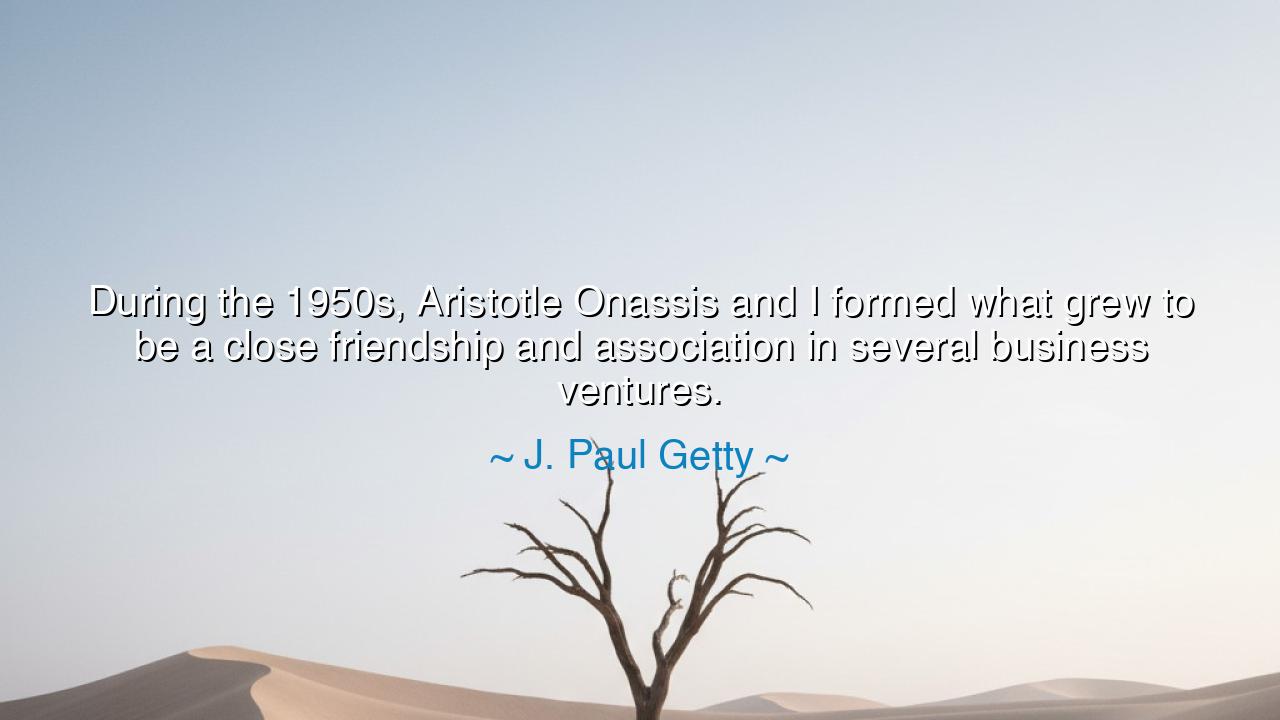
During the 1950s, Aristotle Onassis and I formed what grew to be
During the 1950s, Aristotle Onassis and I formed what grew to be a close friendship and association in several business ventures.






“During the 1950s, Aristotle Onassis and I formed what grew to be a close friendship and association in several business ventures.” Thus spoke J. Paul Getty, one of the titans of the modern age, whose empire stretched across oceans and whose wealth rivaled that of kings. In this statement—simple in phrasing yet profound in implication—Getty reveals a truth about the intertwining of friendship and enterprise, of trust and ambition, of the human bonds that exist even among those who stand at the summits of power. Beneath his measured words lies a recognition that great endeavors are never built by one man alone, but through alliances forged not merely in profit, but in mutual respect and shared purpose.
The origin of this quote lies in Getty’s reflections on his long and complex relationship with Aristotle Onassis, the legendary Greek shipping magnate. Both men were giants of their age—brilliant, ruthless, and insatiably driven. In the 1950s, their paths crossed in the world of oil and shipping, industries that were then the beating heart of global commerce. What began as a pragmatic alliance between two businessmen grew into a genuine friendship, a rare bond between equals in a realm often ruled by rivalry. In this partnership, each recognized in the other not just power, but intellect, cunning, and vision. They were, as the ancients would say, men of arete—of excellence—drawn together by the fire of enterprise and the respect that only the great can give to the great.
But Getty’s words also carry a subtle tone of reflection, even of reverence. For though both he and Onassis were men accustomed to wealth and influence, the friendship they shared transcended mere business. In a world where alliances are often fleeting and loyalty bends to profit, theirs endured because it was built upon the bedrock of trust. Each understood that the success of their ventures depended not only upon contracts and negotiations, but upon the deeper understanding of character. Getty, ever the shrewd observer of human nature, knew that the greatest currency in life is not money—it is confidence between men, the faith that one’s word is bond and one’s heart unyielding to betrayal.
Such friendships among the powerful are not unlike the alliances of ancient kings and warriors. Recall the story of Philip of Macedon and General Antipater, whose mutual trust secured the throne for young Alexander the Great. When Philip was slain, it was Antipater’s loyalty that safeguarded the realm and ensured the rise of the empire. Like Getty and Onassis, their bond was not sentimental but strategic—yet within it burned a form of nobility, for it recognized that strength joined with strength can achieve what strength alone cannot. The lesson is timeless: even the most capable man must seek companionship, for in unity lies endurance, and in mutual respect lies power that no fortune can buy.
Getty’s statement also reveals a paradox: that friendship born amid ambition can be both pure and perilous. The friendship of equals often demands as much courage as the pursuit of success itself. When two strong souls meet, there is always the risk of conflict—the clash of wills, the competition of pride. Yet if they can temper their strength with respect, their partnership becomes a force of creation. Getty and Onassis, though different in style—Getty reserved and intellectual, Onassis flamboyant and bold—found in their differences the fuel for mutual growth. Their association, like that of fire and wind, burned brighter because each fed the other’s intensity.
In this way, Getty’s words stand not only as a recollection but as a teaching. He reminds us that friendship is not confined to the soft places of life—it also thrives in the midst of struggle, ambition, and enterprise. To form a bond in such a world requires integrity, courage, and wisdom. True friendship is not the absence of challenge, but the presence of respect amid challenge. It is the art of seeing another’s greatness without envy, and of building something together that neither could have achieved alone.
Let this then be the lesson: seek not merely companions for comfort, but comrades in purpose. Whether in business, art, or life, find those whose vision sharpens your own, whose strength awakens your courage, and whose honesty steadies your path. And when you find them, guard that bond as sacred, for such friendship is rarer than gold and more enduring than empire. Work with them not only to profit, but to build—to leave behind something greater than yourselves.
For as J. Paul Getty reminds us, the true measure of success is not what we possess, but whom we walk beside on the journey. Wealth fades, ventures end, but friendship founded on trust and purpose becomes part of history itself—a legacy not of fortune, but of faith between souls who dared to dream together.






AAdministratorAdministrator
Welcome, honored guests. Please leave a comment, we will respond soon